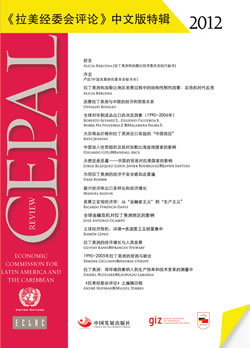Special Edition of the CEPAL Review in Mandarin Is Now Available Online
Work area(s)
Topic(s)
Includes 15 relevant articles on economic relations between China and Latin America and the Caribbean.

(27 May 2013) The CEPAL Review, which is the main academic publication of the United Nations Economic Commission for Latin America and the Caribbean, has today made available to its readers a special electronic edition in Mandarin.
The Special edition, which aims to contribute to exchanges between China and Latin America and the Caribbean, contains 15 articles published between 2000 and 2011.
In the articles, renowned experts analyse economic and trade relations between the two regions. The articles also attempt to provide Chinese academics and public policymakers with a general overview of the main topics covered by the CEPAL Review that reflects the editorial policy.
In the space of a few years, China has become the world's second largest economy and one of the main trading partners for Latin America and Caribbean countries. According to ECLAC, China's exports and imports to and from the region have grown twice as quickly as trade with the rest of the world.
According to Alicia Bárcena, Executive Secretary of ECLAC, "This special edition is also an open invitation to Chinese researchers to have their work published in the CEPAL Review".
The senior United Nations official highlighted the various initiatives that the institution had taken part in to strengthen ties between Latin America and the Caribbean and Asia-Pacific (and China in particular), as well as the recent visit to ECLAC by Chinese Premier Wen Jiabao, who suggested stepping up strategic cooperation between the two parties.
In the article "Improving economic and trade ties between Latin America and China", Osvaldo Rosales, Director of the ECLAC Division of International Trade and Integration, reviews the expansion of China and other emerging Asian economies and analyses the opportunities this offers to Latin American and Caribbean countries, with a special emphasis on international trade and foreign direct investment.
In the article "The ‘China effect' on commodity prices and Latin American export earnings", Rhys Jenkins, Professor of the School of International Development, University of East Anglia, Norwich, United Kingdom, estimates how greater Chinese demand for Latin America's 15 main commodity exports from 2002 to 2008 has influenced rising prices for these goods.
The article "Determinants of world manufacturing exports to China, 1990-2006", by Universidad de Chile economists Roberto Álvarez, Eugenio Figueroa, María Pía Figueroa and Macarena Palma, uses economic techniques and gravity models of trade to identify the main variables that determine Chinese manufacturing exports to 79 world economies in the period 1990-2006.
Producing this special edition in Mandarin was made possible thanks to the support of the German Agency for International Cooperation (GIZ) of the German Federal Ministry for Economic Cooperation and Development (BMZ) and China Development Press.
In China, this special issue in Mandarin was launched in Beijing in October 2012, at an event organized by ECLAC and the China Development Research Foundation (CDRF). Director of the CEPAL Review, André Hofman, attended the event on behalf of ECLAC Executive Secretary, Alicia Bárcena.
The CEPAL Review was set up in 1976 by Raúl Prebisch, one of the main inspirations behind this regional commission of the United Nations, and has been a means of disseminating ideas from the research community within the Commission and in the region in general. It is listed in the Social Sciences Citation Index (SSCI) of Thomson Reuters and in the Journal of Economic Literature.
Download the complete Special edition of the CEPAL Review in Mandarin on the ECLAC website.
Any queries should be sent to the ECLAC Public Information and Web Services Section.
E-mail: prensa@cepal.org; Telephone: (56 2) 2210 2040.
Country(ies)
- Latin America and the Caribbean
-
China
Related project(s)
Contact
Public Information Unit
- prensa@cepal.org
- (56 2) 2210 2040
